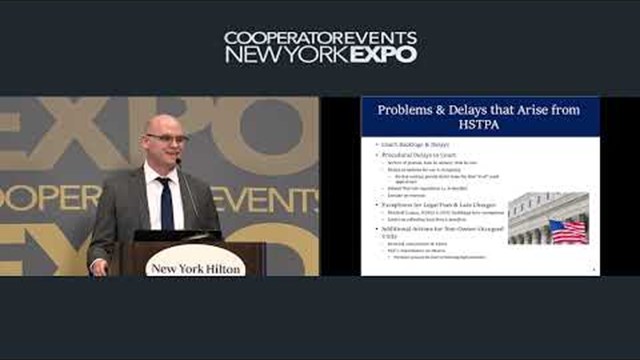One of the most important issues in deciding if a cooperative or condominium apartment is a wise
investment is the financial status of the building itself. The key document that potential buyers should review is the annual financial statement. This review, commonly known as due diligence, should be performed by either an attorney or an accountant before signing any contracts. However, before incurring the expense of retaining a professional, there are certain key elements of a financial statement that can be reviewed by the buyer himself.
Financial statements are often required by banks before they will approve individual loans to apartment buyers. A good financial statement, if properly prepared, will convey complex facts with simplicity and will be easy to read. It is important to try to review the last two years of financials to track changes in income, expense and reserves.
The financial statement is usually prepared by a certified public accountant. When prepared accurately, the statement will indicate whether the building is in good or poor financial condition. A financial statement should include a balance sheet describing assets and liabilities, a statement of income and expenses (also known as a statement of operations) and a statement of cash flows. Footnotes are used to clarify many of the numbers that appear in the statement and will disclose other pertinent financial information.
Understanding the
Ownership Concept
Before reviewing a financial statement, it is important to understand the difference between a cooperative and a condominium. In a co-op, a corporation usually owns the land and the building in which the apartment is located subject to an underlying mortgage. A purchaser will be acquiring shares of stock in the corporation (commonly known as the apartment corporation) rather than taking title to real property. The apartment corporation will issue stock in the purchaser's name based on the number of shares allocated to the apartment. The purchaser is permitted to live in the apartment pursuant to the terms of a proprietary lease, which sets forth the shareholder's and the corporation's responsibilities. Accordingly, the purchaser has a dual status: he or she is a shareholder and a tenant.
The purchaser will pay as rent (called maintenance charges) a proportionate share of the apartment corporation's cash requirements for the operation and maintenance of the building. Maintenance is generally comprised of three components: real estate taxes on the entire building; payments for the underlying mortgage on the entire building; and the general operation and repair of the entire building (including salaries, management fees, insurance, fuel, electricity in the common areas, legal fees, etc.). As a shareholder, the purchaser will have the right to vote annually for the board of directors who will conduct the financial affairs of the apartment corporation and supervise the operation of the building.
The ownership of a condominium apartment is similar to the ownership of real property. In a condominium, a purchaser owns the apartment plus a percentage of the common areas of the building based upon the size of the apartment. There is no underlying mortgage in a condominium building since all of the apartments have separate tax ffb lots. The purchaser will take title by deed which is then recorded in the county register's office.
The purchaser pays monthly common charges which are his or her share of employee salaries, insurance, fuel, management, cleaning and upkeep in the building. The purchaser will pay his own real estate taxes allocated to the apartment. The common charges for a condo unit are usually significantly less than the maintenance charges for a co-op since real estate taxes and payments on an underlying mortgage are not included in common charges.
While there is still a condominium board that runs the affairs of the building, generally there is no board approval or financing limitations on the amount of money a purchaser can borrow to purchase a condo apartment.
Assets and Cash Flow
There are three major areas to focus on when reviewing financial statements: assets, income and expenses. If the building is a co-op, the status of the underlying mortgage is also very important. The assets section of the financial statement should reflect what amount of cash and/or reserve fund is held by the apartment corporation or the condominium. The cash on hand is the amount of uninvested money held by the apartment corporation or the condominium at year end. The reserve fund generally consists of monies that have been invested and is used for repairs or capital improvements to the building. However, the board may have other reasons to utilize these funds. For example, if an underlying mortgage is to be refinanced, these funds may be used to pay for the expenses incurred in refinancing.
The general rule followed by accountants is that the reserve fund should equal one-third of the annual maintenance income. This rule may be unrealistic if the building expects to make major repairs or improvements. Many cooperative reserve funds are replenished by income received from the flip tax, a charge levied when units change hands. Check with your realtor to see if the building you are considering has a flip tax.
Next, look at the statement of income and expenses section of the financial statement. It will indicate whether or not the apartment corporation receives maintenance or common charge payments in excess of the operating expenses. If it does, the result will be a cash surplus to the building. If it does not, the result will be a deficit. This shortfall may be offset with monies received from flip taxes, sublet fees, interest income from reserve funds, laundry income and commercial rent, if any. If operating expenses exceed maintenance charges or common charges even with the monies to help offset expenses, it is most likely that maintenance or common charges will be increased to cover the shortfall, or a special assessment may be charged to all unit owners or shareholders.
The Underlying Mortgage and Sponsor-Owned Shares
One of the most important issues in deciding to purchase a cooperative apartment is the status of the building's underlying mortgage. A majority of apartment corporations will own their building with one or more mortgages usually held by an institutional lender. It is very important to make a determination as to what type of mortgage exists, how many mortgages there are and when they will mature.
The details of the underlying mortgage are usually found in the footnotes section of a financial statement. If the mortgage is maturing soon, it will most likely have to be refinanced at a significant expense to the apartment corporation, unless it is such a small amount that the shareholders can absorb paying off any principal balance remaining at maturity. A long-term mortgage is more favorable to a shareholder since there will not be a risk in locating a new lender and incurring a large expense in a short time period. If the underlying mortgage is maturing soon, it may be difficult to locate a lender to provide a co-op loan to an individual purchaser. Many lenders require a minimum of two years to be left on the underlying mortgage before it will make a loan to a purchaser of a co-op apartment.
I ffb f the mortgage has a fixed interest rate, the monthly installment will remain constant. However, if the rate is adjustable, the monthly installment may fluctuate, possibly causing maintenance to increase. Another important issue is whether monthly installments are applied to interest only, or if the payment is amortized. If the mortgage is amortized, a portion of the monthly payment is utilized to reduce the principal balance of the loan. If the payments are applied to interest only, at maturity the entire principal balance will have to be refinanced. When an unamortized loan matures, it may mean the apartment corporation will have to refinance the entire principal balance at a higher interest rate which may result in an increase of maintenance.
Many lenders will not finance or refinance an underlying mortgage in a building that has more than 30 percent sponsor-owned apartments. Therefore, if a mortgage is coming due shortly, a purchaser should determine how many apartments are sponsor owned. Keep in mind that many financial statements do not disclose this information. Your realtor should be able to provide you with the number of unsold apartments in the building.
As previously stated, a condominium does not have an underlying mortgage on the building. However, if the sponsor owns numerous apartments in the building, the cost of the real estate taxes and common charges on those units, along with any mortgage debt he may have, may exceed any income (i.e. rent) he may receive on those units. If he can no longer meet his expenses and fails to pay common charges, it will have a negative effect on the running of the building. Most financial statements do not disclose how many apartments a sponsor owns or whether the income he receives exceeds his expenses. This information is usually disclosed in an amendement to the offering plan and should be closely examined.
Not the Sole Source of Information
Financial statements are usually finalized and released to shareholders between March and May if the fiscal year ends on December 31. If you purchase a co-op in February, March or April the financials can be over 14 months old and many numbers may have changed. For example, it is possible that an underlying mortgage in a co-op may have been refinanced within this time period. The managing agent of the co-op or condo will usually provide updated information.
Although a financial statement provides insight into a building, it is not to be relied on solely to determine whether the corporation or condominium is financially sound. The following areas should be examined as well: maintenance or common charge history; whether there are, or have been, assessments and for what reason(s); whether there are real estate tax abatements and what the tax will be when the abatement expires; the number of apartments that are sponsor- or investor-owned; what repairs have been, or will be, made in the building; whether there is a flip tax (if the building is a co-op); whether there is pending litigation against the co-op or condo; and when commercial leases that bring income to the building expire.
If poor financials may appear to make an apartment unsalable, it is possible to reduce the purchase price of the apartment to reflect the financial condition of the building. Buying a cooperative or condominium apartment is a difficult proposition requiring the expertise of a professional. However, before a purchaser jumps to hiring an attorney or accountant to examine financial statements, a purchaser can perform his own initial due diligence to determine whether or not to proceed with the transaction.
Mr. Gonchar is a partner at the Manhattan law firm of Monroe Partners International P.C. and treasurer of his 275-unit co-op in Manhattan.









7 Comments
Leave a Comment